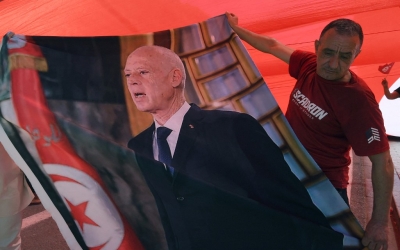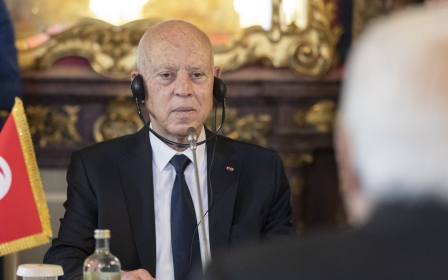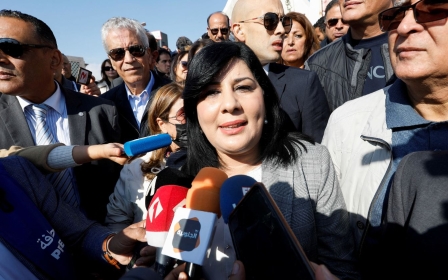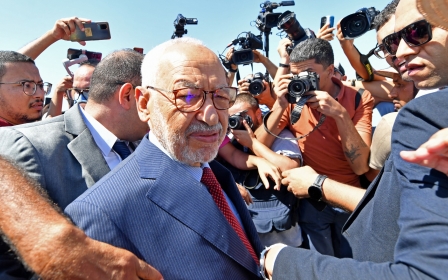Tunisia: Four presidential candidates jailed and barred from elections
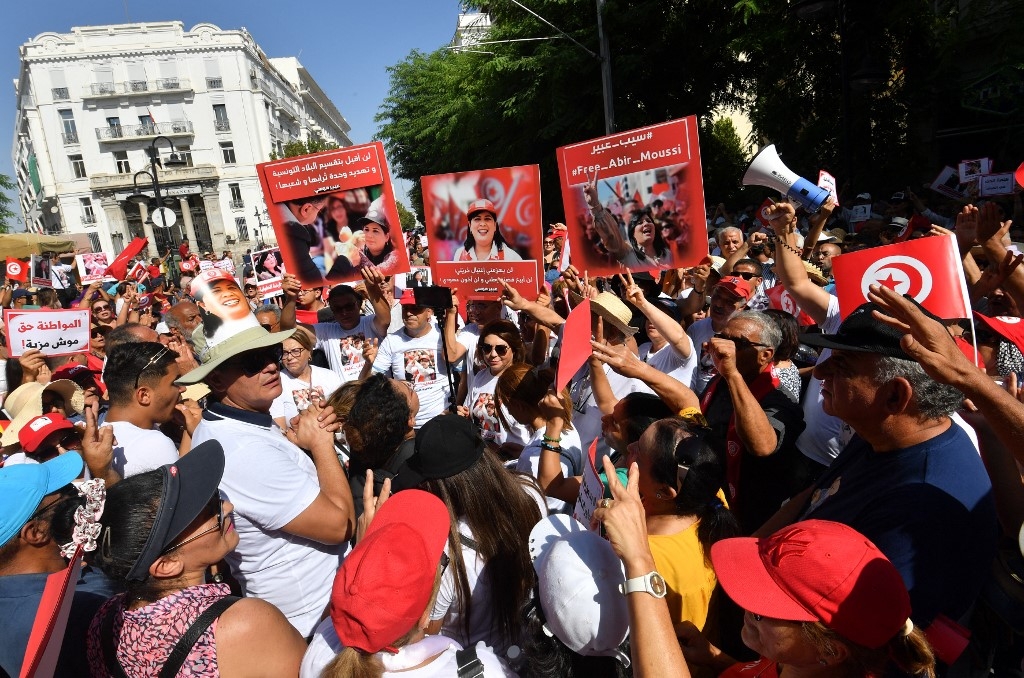
A Tunisian court has sentenced four potential presidential election candidates to eight months in prison and banned them from running for office on a charge of vote buying ahead of the 6 October poll.
The decision was issued on Monday against prominent politician Abdel Latif Mekki, activist Nizar Chaari, judge Mourad Massoudi and would-be candidate Adel Dou.
"The decision is unfair and unjust, and aims to exclude a serious player from the race," Ahmed Nafatti, the manager of Mekki's campaign, told Reuters.
"It is a shocking rule, it aims to keep us away from running for the race after a series of restrictions," Chaari told the British news agency.
The ruling comes as the Tunisian authorities have been accused of using arbitrary detention and administrative obstacles to ensure the re-election of Kais Saied.
New MEE newsletter: Jerusalem Dispatch
Sign up to get the latest insights and analysis on Israel-Palestine, alongside Turkey Unpacked and other MEE newsletters
Several would-be candidates challenging the incumbent president - who seized wide-ranging powers two years after his election in 2019 - are either in prison or being prosecuted.
Late on Monday, Abir Moussi, a key Tunisian opposition figure and potential candidate for the upcoming election, was sentenced to two years in prison, according to local media.
Moussi, 49, a former lawmaker head of the Free Destourian Party (PDL), which was close to deposed president Zine El Abidine Ben Ali, had submitted her candidacy on Saturday via her lawyers.
She was arrested in October in front of the presidential palace, where she had gone to file appeals against decrees issued by Saied.
The High Authority for Elections (ISIE) filed complaints against her in February after she made public statements criticising the electoral body.
Moussi is a staunch critic of Saied and has been sentenced under decree-law 54, a piece of legislation enacted by the current president in 2022 to combat "false news".
Critics have accused the law of being used to repress political dissent, with sentences of up to 10 years in prison.
Over the past 18 months, more than 60 critical voices have been prosecuted under the decree, according to the National Union of Tunisian Journalists.
If the sentencing against Moussi is upheld on appeal or later proceedings, she will officially be barred from running for office as one of the candidacy criteria is that hopefuls must have a clean criminal record.
'Exclude every opposing voice'
Other jailed would-be candidates include Issam Chebbi, leader of the centrist Al Joumhouri party, and Ghazi Chaouchi, head of the social-democratic party Democratic Current, both held for "plotting against state security".
The case targets opponents who are being prosecuted under around 15 charges that could lead to the death penalty. The media are prohibited from addressing the file, which is empty according to the lawyers.
The seven men accused in this case have exceeded the legal 14-month detention period without trial.
In February 2023, Saied declared that those who would dare pronounce a verdict of innocence would be considered accomplices of the defendants.
Among the more than 20 Saied's opponents detained since a flurry of arrests began in February 2023, figures Lotfi Mraihi, a potential presidential election candidate and fierce critic of the president, who was sentenced to eight months in prison and a lifetime ineligibility on a charge of vote buying in July.
Ahmed Souab, a former administrative judge turned lawyer, told Middle East Eye in July that the verdict was "a politically premeditated legal error".
Also on Monday, at least four other prominent potential candidates said authorities had rejected their requests to access their criminal records - a new requirement for candidates to register for the election.
Among them, Mondher Zenaidi, who said in video posted on Facebook that "the authority working under Saied's instructions refused to give [him] the criminal record".
The move unofficially bars him and others from joining the race, as the deadline to submit candidacies is Tuesday.
Retired admiral Kamel Akrout, another would-be candidate, said in a Facebook post that authorities were "unable to deliver [his] criminal record" because the job title on his national ID card was out of date.
"The ruling authority has decided to exclude every opposing voice" and "move towards an undemocratic system that rejects pluralism and peaceful alternation of power," said Akrout.
Rapper-turned-businessman Karim Gharbi - better known by his stage name K2Rhym - posted a video on Facebook in which he showed a letter rejecting his request to obtain the criminal record, without specifying a reason for it.
Last week, four women working on Gharbi's presidential campaign were given jail time for allegedly buying signatures of endorsement, AFP reported.
Saied aims at 'non-patriots'
Two years after his elections, Saied, 66, dissolved parliament in 2021 and began ruling by decree in a move the opposition has described as a coup.
He has said he will not hand over power to what he calls "non-patriots".
When submitting his official candidacy for the election on Monday, Saied denied placing any restrictions on rivals, saying that "whoever talks about restrictions is delusional".
"There are no restrictions on potential candidates for the presidential elections… this is nonsense and lies," Saied told reporters after submitting his file.
'Violations that we thought part of Tunisia's past are becoming more and more discernible and systematic'
- Agnes Callamard, Amnesty International
"We will not accept any foreign party interfering in the choices of our people," he added.
Last week, a group of around 30 NGOs denounced the "arbitrary detention" of candidates, an electoral authority that has "lost its independence" and "the monopolisation of the public space" to bolster Saied's re-election bid.
Created in 2011 to take the organisation of elections out of the control of the interior ministry, the ISIE's independence was previously guaranteed by its method of appointment, whereby members were elected by a reinforced majority of two thirds of the legislative assemblies.
But since the 2021 coup de force, the members of the electoral body have been directly or indirectly chosen by Saied.
Last month, Amnesty International's Secretary General Agnes Callamard said that since Saied's power grab, "violations that we thought part of Tunisia's past are becoming more and more discernible and systematic".
"Instead of the vibrant debates of a pluralist political scene, I observed government repression, fuelling fear and dread about what's to come," she said.
Middle East Eye delivers independent and unrivalled coverage and analysis of the Middle East, North Africa and beyond. To learn more about republishing this content and the associated fees, please fill out this form. More about MEE can be found here.


